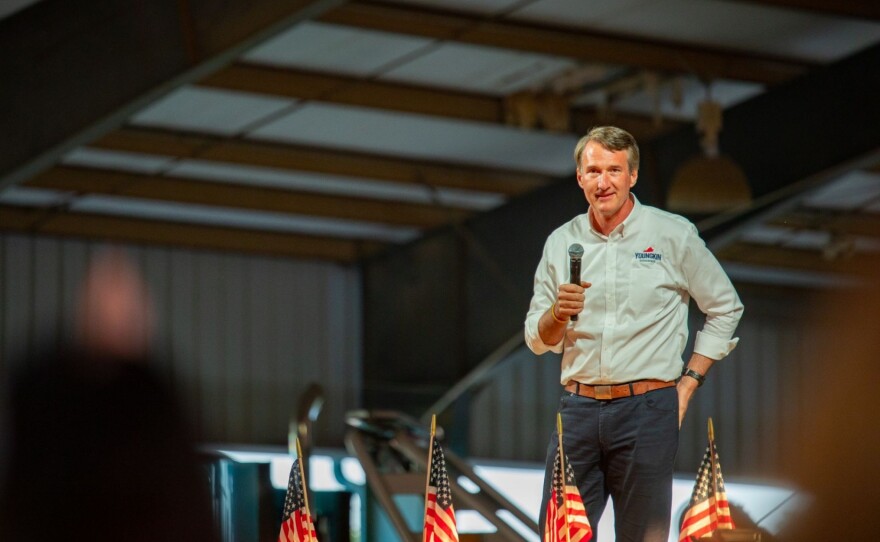Virginia Republicans have chosen businessman Glenn Youngkin to be their nominee for governor. It was a remarkable win for the former CEO of the Carlyle Group, who has not run for office before and was not widely known outside of GOP political circles even six months ago.
The 54 year-old Youngkin pitched himself as a pro-life and pro-gun Christian who was best-positioned to take on Democrats in the vote-rich suburbs of Washington DC, Richmond, and Hampton Roads. He argued he would bring in voters ranging from Never-Trumpers to Tea Partiers to Democrats -- a necessary recipe in a state where Republicans haven’t won a statewide election since 2009.
“Virginians have made it clear that they are ready for a political outsider with proven business experience to bring real change in Richmond,” Youngkin said in a statement.
Youngkin poured over $5.5 million dollars of his personal funds into his nomination fight. Much of that money went into TV ads, including one featuring former President Donald Trump. He cast himself as an outsider, arguing the commonwealth’s economy needed a new, business friendly-manager.
Youngkin’s first policy proposal took a cue from Trump’s rhetoric in the form of a “ Election Integrity Task Force.” Youngkin argued that voters from both sides of the aisle distrust elections, pointing to voters who challenged the 2016 and 2020 presidential votes. A Reuters poll released in April found six in ten Republicans believed in Trump’s false claims that the vote was stolen from him. Youngkin stumped alongside U.S. Sen. Ted Cruz (R-TX), who led the effort in the Senate to object to the certification of President Joe Biden’s victory.
“People absolutely continue to not have faith in the process,” Youngkin said in an interview last month.
Pressed on whether he personally believed false claims of widespread voter fraud, Youngkin hedged.
“Our president is Joe Biden because he was inaugurated as such,” he said. “And so what we have to do is look forward at what we have to fix.”
Youngkin has called for photo IDs for all ballots; an application to prove citizenship before casting mail-in ballots; a non-partisan Department of Elections; two witness signatures for mail-in ballots; signature-matching software for signatures; and audits of voting machines within 30 days of elections.
Manuel Bonder, a spokesman for the Democratic Party of Virginia, said in a statement that Youngkin “continues to repeat Donald Trump’s Big Lie -- embracing an unhinged conspiracy theory that led to the deaths of five people, including Capitol Hill police."
The 6 foot, 6 inch businessman pitches himself as a pro-life and pro-gun Christian. He argued in his stump speech that Virginians’ Constitutional rights had been “violated like never before.”
Youngkin got blowback from some conservatives for not answering questionnaires sent by the National Rifle Association and the Virginia Citizens Defense League -- a move some activists argued would precipitate a pivot on the issue in the general election.
Like most of the other seven GOP candidates, Youngkin railed against school closures and vowed to defend law enforcement.
He’s vowed to make further investments to shade the commonwealth a few hues more red -- not only in state races, but also in the House of Delegates and local races for school board and sheriff.
“If we don't push back against the money that's coming from George Soros and others, we will never win these most important local seats,” Youngkin told a crowd of Republicans at an event in King William County last month. “It will not be a lonely victory for me in November.”
The GOP hasn’t won a statewide election since 2009. Party chair Rich Anderson argued they were well-positioned to change that despite a fractious nominating fight.
“That’s not just the party chairman with happy talk,” Anderson said in an interview Monday. “This is a pendulum business. A party can stay in power for only so long.”
Youngkin will face the winner of a June 8 Democratic primary. Former Gov. Terry McAuliffe holds a large lead over four other candidates in recent polls.
Youngkin’s lack of political record could be an asset for voters who are not deep partisans, especially compared to McAuliffe, argued Stephen Farnsworth, a political science professor at the University of Mary Washington.
“Youngkin does not seem to me to be the strongest GOP general election candidate -- I'd say former Speaker [of the House] Kirk Cox would have been better at connecting with those precious suburban swing voters -- but he certainly is a viable candidate and far from the worst choice for the party,” Farnsworth said.
Susan Swecker, chair of the Democratic Party of Virginia, painted Youngkin as a “far-right extremist who has demonstrated total allegiance to Donald Trump.”
“Throughout this campaign, Youngkin has advanced Trump’s dangerous election conspiracy theories, opposed critical COVID-19 relief for working families and small businesses, and threatened to gut Virginians’ health care,” she said in a statement.




